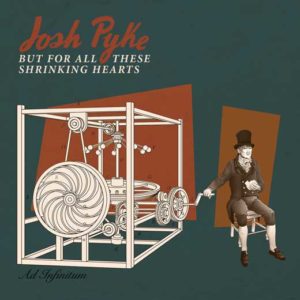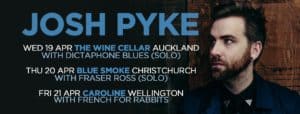Josh Pyke: The 13th Floor Interview
Australian singer-songwriter Josh Pyke is heading across the Tasman for his first NZ shows in a decade.
The 13th Floor’s Marty Duda spoke to Josh Pyke recently and found that although Josh hasn’t performed in NZ for a while, he has been a regular holiday-maker here.
Click here to listen to the interview with Josh Pyke:
Or, read a transcription of the interview here:
MD: You’re coming to New Zealand very shortly, aren’t you…?
JP: Yeah. I’m excited. It’s been about ten years since I’ve toured there. I was actually there last year for a holiday, but I’m very excited to get back there and play some shows.
MD: You’ve been taking advantage of our fine holiday weather, and not playing here; is that right?
JP: Yes, exactly.
MD: Where did you go for your holiday?
JP: We did North Island; so, we started in Auckland and, basically, drove down to Wellington. It was magical, beautiful.
MD: I’m curious – because I’m American… but I’ve been living in Auckland for twenty some years – why is it that some people come to New Zealand? What’s the difference between travelling around New Zealand and travelling around Australia?
JP: Geographically… it’s just very different. I think it’s been proved by the success of the movie industry there. There’s that, and I think, culturally, it’s quite interesting: there’s a lot of stuff going on. Auckland’s really cool, and Wellington, in particular, has such a great, arty community feel, but it’s still a city. It’s just quite an interesting place, geographically and culturally, for me.
MD: You must travel around Australia all the time, being a working musician.
JP: I do, yeah. I think I’ve been to more places in Australia than anybody else I know; which is pretty nice. I’ve seen a lot of the country.
MD: Why has it been ten years since you’ve played here?
JP: I honestly don’t really know – like I say: I’ve been over there four or five times for kicks – but the last time I toured there, was with a band called Youth Group, who are an Australian band – I don’t think they exist anymore. We did a tour, which was really great. I think a lot of Australian bands don’t do it because, obviously, the population is really small in New Zealand; so, in order to make it scale and work, it often doesn’t work for bands. But I play solo in Australia all the time; so, I just thought, “Why haven’t I been back there solo?” Then I was chatting to a mate of mine, Jack Cardy, who’s an Australian musician who’s been over there a few times in the last couple of years, and always has a great time. I was like, “Oh, bugger it! I’m just going to book a tour, and see what happens.” I don’t know if anyone’s going to show up, but I’m going to be there, and it’ll still be fun.
 MD: Musically, where are you these days? I know your most recent album came out in 2015, But For All These Shrinking Hearts. Does that give an indication of where you’re at these days, or are you doing other things?
MD: Musically, where are you these days? I know your most recent album came out in 2015, But For All These Shrinking Hearts. Does that give an indication of where you’re at these days, or are you doing other things?
JP: In terms of the songs that I’m writing, currently, I feel like I’ve stripped it back a lot again. I never really know why it is. I’ll write a bunch of songs, and then after ten or so songs, I’ll realise that there’s some themes, aesthetically and lyrically, that are popping up; so yeah, I feel like the songs, at the moment, that I’m writing, are a lot more raw and stripped back. Last year, I released an album that I did in collaboration with the Sydney Symphony Orchestra, and maybe it was a bit of a jumping off point, from that project, to get back into some more stripped back stuff – that’s very much how it started for me as well – but I just play it by ear. I probably won’t put out another record for a year or two; so, I’m just doing whatever, seeing where my musical nose takes me.
MD: I think I saw somewhere that you had just gotten… something called an octave guitar; is that right? Maybe you can explain what that is, and how that came about.
JP: That was just a fan: I was playing on the north coast of Australia, and a fan was at the show, and he was a luthier, and he said that he makes these octave guitars – it’s basically a small guitar which is an octave higher than a normal guitar – and he had been thinking how he could imagine me writing some good songs on that sort of guitar, and he brought one to the show, and I played it, and I was like, “This is beautiful,” and he’s like, “I want to make one for you,” and I was like, “Okay. That sounds fantastic!” He sent it up, and it’s a gorgeous thing. I’ve already come up with a couple of ideas on it. Sometimes, when you jump on a new instrument, it just becomes a pretty inspirational thing. It’s a very nice gesture.
MD: Do you write almost everything on a guitar, or do you move around to other instruments when you’re writing?
JP: It’s predominantly on the guitar, but occasionally, I’ll write something on the piano. I’ve written quite a few songs on the autoharp as well, because I find the intervals between chords, on an autoharp, is quite different from guitar; so, you get out of the same muscle memory patterns that you often go back to, on guitar. It’s good to move around a bit.
MD: It seems to be a theme among people who I talk to: they’re always trying to find something to get them out of what they’ve been doing over and over again, but nothing dramatic that’s going to put them out to sea somewhere, but just to help them have a gentle prodding to write something different, I guess. Is that what you’re looking for?
JP: Yeah, definitely! You spend so much time doing something – I’ve been writing songs for twenty five years, it’s been my job for the last twelve years, and when you do something every day, it’s pretty easy to get stuck in your own habits; and while in some ways, that’s what allows you to have your own unique sound, it’s always good to push your boundaries and find new directions, I think. It’s the same in life, as well as in song writing: doing the same thing every day drives you crazy; so, it’s good to expand your horizons.
MD: I think I also read somewhere – I may be wrong here – that you own a couple of chickens, Gertrude and Rosie; is that right?
JP: (laughs) I do, yes!
MD: I used to own chickens myself, and I find them infinitely entertaining to sit and watch; and relaxing too.
JP: Yeah, they are really relaxing. It’s good to watch them peck around. It’s a nice vibe: I’ve got my studio in my back yard, and I can see the chickens pecking around in the garden; it’s very nice.
MD: They’re strange animals. I notice that they act weird during the sunset and first thing in the morning.
JP: Yeah! They’re odd. They’re off the lay at the moment. It’s been raining a lot. Yeah, they’re very quirky.
MD: So, you live out in the country side?
JP: No, not at all. I live in the inner city in Sydney, but we’ve got a pretty big back yard, and I’ve got two little kids; so, it’s nice to have bit of wild life hovering in.
MD: I’m sure having chickens in the middle of the city seems perfectly reasonable.
JP: No roosters. You’re not allowed to have roosters.
MD: Well, that makes perfect sense. We had a neighbour who had a rooster, and that didn’t go over so well. So, when you get over here – it’s just you, solo, I assume – when you come to place where you haven’t been playing for a while, do you feel out the audience and see what they’re looking for, or do you say, “Here you go. This is what I’m doing”?
 JP: I always play from the full gamut of my catalogue; so, I’ll be playing old stuff and newer stuff, but it’ll be solo and stripped back. I’ll just feel it out, in the sense that I can’t do anything other than what I do anyway. I’m just really looking forward to playing shows over there, because, when I was there last year on holiday, I was, once again, struck by just what a good, cultural place New Zealand is; where it seems to really be supportive of the arts; so, I’m just keen and excited to get to play to some new faces in a couple of new places.
JP: I always play from the full gamut of my catalogue; so, I’ll be playing old stuff and newer stuff, but it’ll be solo and stripped back. I’ll just feel it out, in the sense that I can’t do anything other than what I do anyway. I’m just really looking forward to playing shows over there, because, when I was there last year on holiday, I was, once again, struck by just what a good, cultural place New Zealand is; where it seems to really be supportive of the arts; so, I’m just keen and excited to get to play to some new faces in a couple of new places.
MD: Well, we’re having a bit of controversy about the supporting of the arts: we have a club here, just around the corner from where I am, called The Kings Arms – it’s been the live rock and roll night club for the last thirty years – somebody called in with a noise complaint last Saturday night and shut down the whole show; one person! Now, everybody’s up in arms, “How can this happen… if they’re in the middle of the city?”
JP: That happens in Sydney all the time: there’ll be an iconic venue, and then they’ll build a block of apartments right beside it and the residents will complain about the noise, and the venue gets shut down. It seems ridiculous, but that’s the way it is, I guess.
MD: Yeah… we’re]trying to squeeze everybody in, but at the same time, there’s no point in living in the city if there’s no city life.
JP: Exactly! It’s ridiculous. Completely stupid.
Click here for more info on Josh Pyke NZ dates.
- The Bacon Brothers – Ballad Of The Brothers(Forosoco/Forty Below) - April 18, 2024
- Silcrow – Too Late To Forget: 13th Floor New Song Of The Day - April 18, 2024
- Ian Hunter – Defiance Part2: Fiction(Sun) (Album Review) - April 17, 2024
